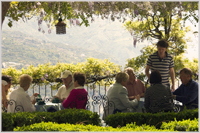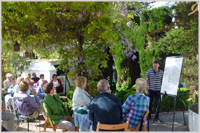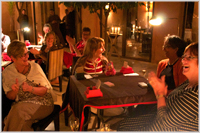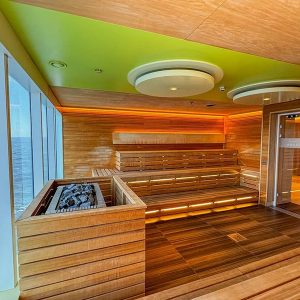 My mother was passionate about bridge so my baptism of fire came early. We played what’s now called kitchen bridge, cutting for partners before we sat down. She viewed players who trumped their partner’s aces with contempt so I prayed I’d draw one of her friends with a less harsh view of teenage ineptitude. When my classmates discussed new films and foreign holidays, I kept quiet. ‘You did what on Saturday night!’ would have been the kindest reaction.
My mother was passionate about bridge so my baptism of fire came early. We played what’s now called kitchen bridge, cutting for partners before we sat down. She viewed players who trumped their partner’s aces with contempt so I prayed I’d draw one of her friends with a less harsh view of teenage ineptitude. When my classmates discussed new films and foreign holidays, I kept quiet. ‘You did what on Saturday night!’ would have been the kindest reaction.
Some years passed before I appreciated how lucky I’d been. When I did, I wished I’d been born a Stocken, a dynasty that proves that bridge is a game best learned young. In the 1960s, I was at Trinity College, Dublin with Peter Stocken and his future wife, Dinah. While I went to race meetings and pubs, they represented the university at green baize tables nationwide. Years later, I took instruction from two of their children, Jack and Zeb, at the Andrew Robson Club in Fulham. When Zeb and his sister Claudia suggested a bridge weekend in the Cotswolds, my answer was an unhesitating yes.
The iconic Robson Club, started by Andrew with Jack and Zeb’s brother, Simon, in 1995, has reinvented the game’s stuffy draconian image by providing a warm welcome, intelligent courses and competitive sessions geared for players of all standards and ages. The same can be said of StockenBridge Breaks, launched by Claudia and Zeb in 2007. Typically, British bridge weekends take place in hotels in Worthing or Eastbourne in November when empty rooms prompt big discounts. No harm in that, but run-down surroundings, indifferent food and constant rain encourage guests to keep their minds on their cards.
 A Stocken break is more like a house party. Anyone can check out a website but Claudia puts in the overnights to make sure her hotels have quality cooking and expert staff in addition to architecture and antiques. Not that staying over is a hardship for her, as I realised as soon as I arrived at the Rectory Hotel in Crudwell near Malmesbury on a glittering autumn afternoon.
A Stocken break is more like a house party. Anyone can check out a website but Claudia puts in the overnights to make sure her hotels have quality cooking and expert staff in addition to architecture and antiques. Not that staying over is a hardship for her, as I realised as soon as I arrived at the Rectory Hotel in Crudwell near Malmesbury on a glittering autumn afternoon.
Friends are encouraged to book in as bridge fours, playing every session and eating every meal together. Others go in couples or alone, arguably even more fun. After easing gently into supervised bridge at tea time on Friday, 24 guests, many of us strangers, met properly over sparkling wine and canapés before we were shown to our tables for a delicious three-course dinner. Just as bridge is about remembering cards, house parties are about putting names to faces and recalling them as required. No one said either had to be easy.
On Saturday, Zeb masterminded two teaching sessions, the first from 10am to noon, the second from 5pm to 7pm, a game plan that left several hours free for visiting local attractions. Not that anyone did: after a pub lunch and a brief leg stretch round the village, it was full house for afternoon play, duplicate for those who like it, rubber or Chicago for those who don’t. With more games after dinner and the next morning, no one could complain of bridge shortfall, yet we were all reluctant to head home when the final session ended at 12.30 on Sunday. And most of us vowed we’d be back.
 One of the Stockens’ locations is The George in Rye in East Sussex where I joined them one StockenBridge autumn weekend.. Dating back to 1575, the coaching inn has a Georgian ballroom and a bar with a ceiling made from the masts of 16th century ships. The décor in the fully renovated bedrooms mixes antique mirrors, tapestries and chaises longues with contemporary furniture and slipper baths, some of them in gleaming metal.
One of the Stockens’ locations is The George in Rye in East Sussex where I joined them one StockenBridge autumn weekend.. Dating back to 1575, the coaching inn has a Georgian ballroom and a bar with a ceiling made from the masts of 16th century ships. The décor in the fully renovated bedrooms mixes antique mirrors, tapestries and chaises longues with contemporary furniture and slipper baths, some of them in gleaming metal.
The itinerary is roughly the same, with too much food and as much wine as you can reasonably quaff while playing bridge. Historic Rye has tempting alternatives – notably Camber Sands, Winchelsea and the Harbour Nature Reserve – but I’m betting none of the guests rate sightseeing and shopping above friendly cards.
 StockenBridge Breaks also run week-long holidays overseas. This year’s flagships are Poggio Ai Santi, a hill-top farmhouse on the southern Tuscan coast with distant views of Elba and Corsica, in October and Chalet les Marmottes in the old part of the Alpine resort of Serre Chevalier, south of Grenoble, in September. The first is a converted family home, with a pool, magical gardens that supply fruit and vegetables for the kitchen and distant views of Elba and Corsica. The second is a lovingly restored farmhouse, a great base for the guided mountain walks that run in tandem with the bridge sessions.
StockenBridge Breaks also run week-long holidays overseas. This year’s flagships are Poggio Ai Santi, a hill-top farmhouse on the southern Tuscan coast with distant views of Elba and Corsica, in October and Chalet les Marmottes in the old part of the Alpine resort of Serre Chevalier, south of Grenoble, in September. The first is a converted family home, with a pool, magical gardens that supply fruit and vegetables for the kitchen and distant views of Elba and Corsica. The second is a lovingly restored farmhouse, a great base for the guided mountain walks that run in tandem with the bridge sessions.
Looking further ahead, Claudia and Zeb are offering two winter bridge weeks in Kasbah Bab Ourika, a hideaway in the Atlas Mountains to the south of Marrakech.  The 18-room eco-friendly lodge has rammed earth walls and brickwork floors, traditional Berber materials that extend to soothingly muted furnishings in cream, brown and beige. Mature terraces and gardens have expansive views across the olive, orange and lemon groves in the Ourika Valley to the snow capped peaks beyond. The kitchen uses locally sourced food to prepare outstanding Berber meals with European touches. In the unlikely event you want to leave the property, you can enjoy hiking, riding and picnics in the National Park or world class golf around Marrakech. Looking forward to seeing you there.
The 18-room eco-friendly lodge has rammed earth walls and brickwork floors, traditional Berber materials that extend to soothingly muted furnishings in cream, brown and beige. Mature terraces and gardens have expansive views across the olive, orange and lemon groves in the Ourika Valley to the snow capped peaks beyond. The kitchen uses locally sourced food to prepare outstanding Berber meals with European touches. In the unlikely event you want to leave the property, you can enjoy hiking, riding and picnics in the National Park or world class golf around Marrakech. Looking forward to seeing you there.
See stockenbridgebreaks.com for up to date prices and offers!
More about Minty
Minty Clinch is a freelance travel journalist with a taste for global adventure. She contributes to national newspapers and magazines on activities that include skiing, horse riding, motoring and golf. Although she often travels on long distance trains and sleeps out under the stars, she can always find time for a quality hotel, a gourmet meal and a game of cards.











